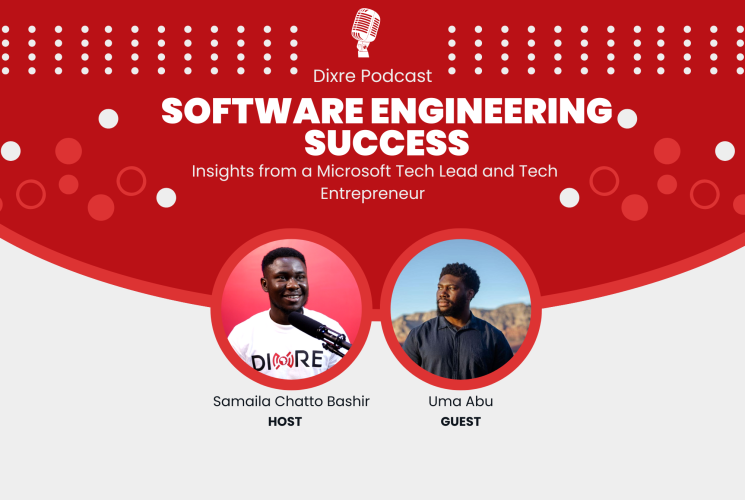
Are you thinking of how to become successful as a software engineer? Then you are in the right place because this episode of the Dixre podcast will take you through the essential path to becoming successful.
A software engineer is a person who applies engineering principles to the design, development, testing, and maintenance of software systems and applications. They use various programming languages, tools, and technologies.
Note that: Software engineers focus on designing software solutions, while software developers focus on building those solutions to make them ready for consumers.
“It’s essential to figure out what needs to be done, how do we bridge that gap and what needs to happen, and once you figure all of that out, what they know and what they don’t know, then it’s easier for you to delegate and say okay, I’ll do this, you go do this, the next person does this but at the end of the day it’s all aligning to people’s strength”- Uma
Leading a team comes with a lot of responsibilities, from knowing the next project to delegating tasks, providing direction and guidance, making decisions, following up with the progress of the work, and a whole lot more.
“The first thing I try to do in situations like that is to understand the system, understand the code base, it may take me a week, it may take me three weeks but understand the process, understand how something is happening, and understand why it’s happening”-Uma
To manage efficiency and costs effectively, start by setting clear objectives and analyzing current processes. Identify areas for improvement and assess the costs and benefits of proposed changes. Develop a detailed plan, implement solutions, monitor progress, gather feedback, and strive for continuous improvement.
“So first I try to know the person, have in-depth conversations with them, try to understand how they got into programming or whatever career field they’re doing and what they want to get out of it.”-Uma
Mentoring, whether in tech or beyond, is crucial for professional growth and career advancement. They impart knowledge, foster skill development, facilitate connections with industry experts, and provide priceless encouragement. Their guidance plays a vital role in shaping mentees’ success and fulfillment in their respective fields.
“It’s all about just making time for what’s important to you, having your priority list, knowing what’s important and what’s not important, what’s urgent and what’s not urgent”- Uma
Coping with responsibilities can be tedious but here are some strategies to follow;
“I don’t try to keep up with trends because trends will keep coming. What I do is, whenever I’m working on a project, I let the project dictate what I use and what I learn. So if I’m building a new app for example and there’s a new framework and it is really good, then I try to build the app using that framework, I don’t go out of my way to learn that framework. Unless it’s fixing a problem you have, you don’t have to pick a new tool”- Uma
Keeping up with new tools and projects is valuable, but don’t chase every trend. Remember the saying “The jack of all trades, master of none.” Focus on mastering existing skills first. Only adopt new tools when they’re truly necessary and relevant to your goals.
“When I first started, I attached learning outcomes to projects. So I started off building a website, why, because we use websites all the time and I wanted to know how this website works, so I built a website and from there I said okay, what’s next? Websites are different from web apps, so let me try to build a web application, one that stores data and then I moved to web applications that stored and fetch data from a database….”- Uma
Start by thinking outside the box, there are so many problems that are yet to be discovered by people, pick these problems up one after the other and proffer solutions, long-term solutions to them.
The future trends in software engineering are numerous and these trends are reshaping the software engineering landscape, driving innovation, and opening up new opportunities for developers to create impactful and transformative solutions. Some of these trends are; Artificial Intelligence and Machines, Cloud-Native Development, Quantum Computing, Cybersecurity, Edge Computing and so many more.
“Show technical competencies and the best way to do that is to work on projects, start with small projects but start working on advancing increasingly like harder projects, increasing the difficulty of the projects to the point where you end up working or doing projects that are very similar to what the engineers are doing. I remember when I was doing technical interviews with companies, they would ask me about the project I was working on and then we ended up chatting for like 15 minutes about a problem I was having and they told me how to solve it and at the end, we’re just talking about the work that they’re doing because my technical level was at their level already, so it made it super super easy for them to hire me and buildup time will be way less. Just be yourself, fall in love with the process, you will enjoy it”- Uma
Interested in gaining more insights into technology, business, remote work, professional networking or even software engineering?
Then the Dixre Podcast is an excellent place for you to get started.
© 2024 Copyrights by ThousandthWords. All Rights Reserved. Developed by Dixre Ltd